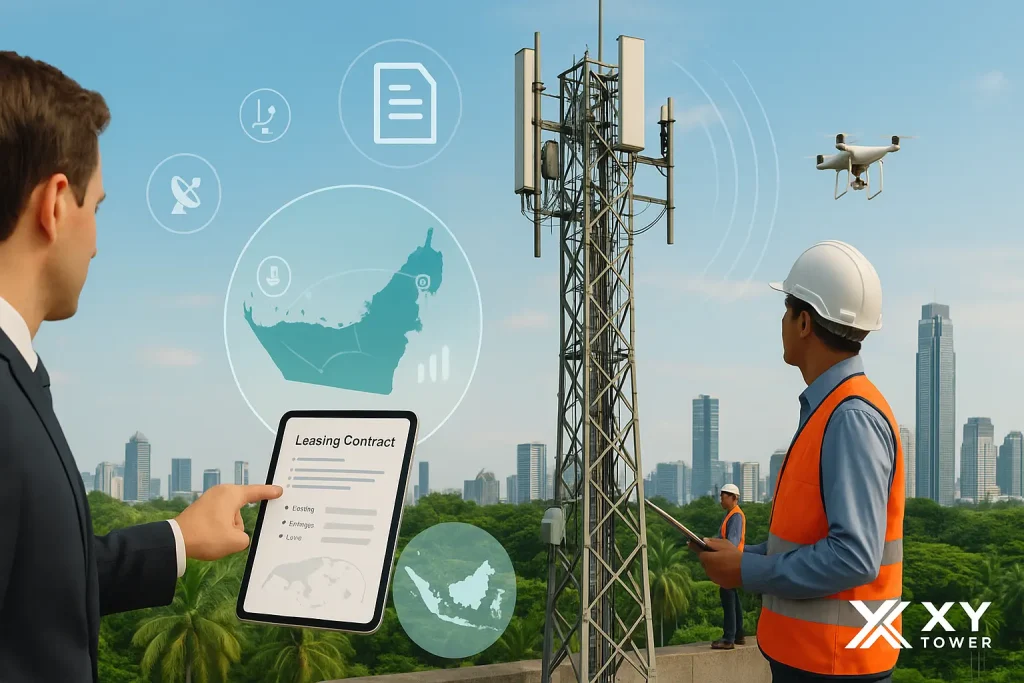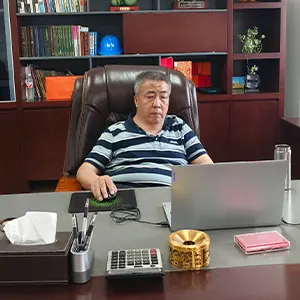Cell Tower Leasing Options in Indonesia
2025-09-25
The process of cell tower leasing in Indonesia is the core of its telecommunications infrastructure market. Indonesia's massive and geographically fragmented landscape makes the shared infrastructure model essential. Independent tower companies (towercos) own the vast majority of telecom towers. They then lease space on these structures to mobile network operators (MNOs). This model provides an efficient and scalable way to expand network coverage across the archipelago. Understanding the dynamics of tower leasing is key to understanding the entire industry. It explains how network expansion is financed, managed, and executed in this major Southeast Asian economy.

Understanding the Cell Tower Leasing Model in Indonesia
The model for cell tower leasing in Indonesia is well-established and sophisticated. It involves a clear set of relationships between different stakeholders. This structure has evolved to meet the specific needs of a large and complex market. It is designed to promote efficiency and accelerate the deployment of network services. The model's success has made Indonesia's tower market one of the most developed in the region. Its principles are fundamental to the operation of the entire telecom sector.
The Key Players in the Leasing Ecosystem
Three main groups of stakeholders participate in cell tower leasing in Indonesia. The first is the tower company, or towerco. These are the owners of the passive infrastructure. They build, own, and maintain the physical towers. The second group is the mobile network operators (MNOs). These are the tenants. They lease space on the towers to install their antennas and other active equipment. The third group is the landowners. These are the individuals or companies who own the land on which the towers are built. They lease the ground space to the towercos.
The Structure of a Lease Agreement
A typical agreement for cell tower leasing in Indonesia is a long-term contract. The towerco signs a long-term ground lease with a landowner. This is often for a period of 10 to 20 years. The towerco then signs separate lease agreements with one or more MNOs. These leases give the MNO the right to install their equipment on the tower. The MNO pays a recurring rental fee to the towerco. This model allows the towerco to generate revenue from multiple tenants on a single tower.
Economic Benefits of the Shared Model
The shared infrastructure model offers significant economic benefits. For MNOs, cell tower leasing in Indonesia allows them to expand their networks with less upfront capital investment. They can avoid the high cost of building their own towers. For towercos, owning towers with multiple tenants creates a predictable, long-term revenue stream. For landowners, leasing their ground space provides a stable source of income. This efficiency is a key reason why the model is so successful and is a core part of the strategy for telecom towers Asia-Pacific.
Key Factors Influencing Leasing Decisions in Indonesia
Several key factors influence the process of cell tower leasing in Indonesia. These factors determine the value of a tower site, the terms of the lease agreement, and the overall success of the partnership. Both towercos and MNOs carefully evaluate these elements before entering into a contract. A thorough understanding of these factors is essential for any party involved in the leasing process. They shape the strategic decisions made by all players in the market.
The Critical Importance of Site Location
The location of a tower is the single most important factor determining its value. A prime location is one that can serve a large number of mobile users. This includes dense urban areas, major transportation corridors, and strategic rural locations. MNOs will pay higher rental fees for access to towers in these high-demand areas. The process of identifying and securing these prime locations is a key competitive advantage for towercos. This strategic site selection is a core part of the business of cell tower leasing in Indonesia.
Technical Specifications and MNO Requirements
Each MNO has specific technical requirements for its network. These requirements influence the type of tower and the amount of space they need to lease. This includes the height of the tower, its structural load capacity, and the amount of ground space available for equipment shelters. A tower must be able to support the MNO's current equipment. It must also have the capacity for future upgrades, such as the addition of 5G antennas. A successful cell tower leasing in Indonesia agreement must meet these technical needs. This technical aspect is also crucial for a provider of a communication tower Indonesia.
The Need for Long-Term, Stable Contracts
Both towercos and MNOs prefer long-term lease agreements. A typical lease for cell tower leasing in Indonesia has an initial term of 10 years. It often includes options for renewal. This long-term stability is important for both parties. It provides the MNO with the assurance of network continuity. It provides the towerco with a predictable revenue stream. This allows the towerco to secure financing for new tower construction. This contractual stability is a hallmark of the industry.
The Process of Negotiating Lease Terms
The negotiation of lease terms is a detailed process. The main point of negotiation is the rental rate. This is influenced by the tower's location, height, and the amount of space being leased. Other important terms are also negotiated. This includes provisions for access to the site for maintenance. It also includes terms for equipment upgrades and site modifications. A well-negotiated agreement for cell tower leasing in Indonesia balances the needs of both the towerco and the MNO. A similar process is followed in the market for a communication tower Malaysia.
The Competitive Landscape of Cell Tower Leasing in Indonesia
The market for cell tower leasing in Indonesia is highly competitive and well-developed. It is dominated by a few large, professional tower companies. These companies compete to build and acquire towers in the best locations. They also compete to secure long-term lease agreements with the major mobile operators. This competitive landscape has created a very efficient market for telecom infrastructure.
The Dominance of Major Publicly-Listed Towercos
The Indonesian tower market is led by a small number of very large, publicly-listed towercos. These companies own and operate tens of thousands of towers across the country. Their large scale gives them significant advantages. This includes economies of scale in construction and maintenance. It also includes strong relationships with MNOs and access to capital markets. These major players are the primary drivers of the cell tower leasing in Indonesia market.
Portfolio Strategies: Build-to-Suit vs. Acquisitions
Towercos grow their portfolios in two main ways. The first is through "build-to-suit" agreements. In this model, a towerco builds a new tower specifically for an MNO that has agreed to be the first tenant. The second method is through acquisitions. Towercos often acquire smaller portfolios of towers from other companies or from the MNOs themselves. A successful towerco uses a combination of both strategies to expand its footprint. This dual approach is common for a cell tower supplier Philippines in its own growing market.
The MNO Perspective: The Tenants
The major mobile network operators (MNOs) are the tenants in the leasing market. Their primary goal is to expand their network coverage and capacity as quickly and cost-effectively as possible. The process of cell tower leasing in Indonesia allows them to achieve this. By leasing space on existing towers, they can avoid the time and expense of building their own. This allows them to focus their capital on their active network equipment and marketing. The strategies of these mobile network operators are the ultimate driver of demand.
Opportunities for Landowners
Landowners are a crucial part of the ecosystem. They provide the land upon which the towers are built. For landowners, a ground lease agreement with a towerco can be a very attractive proposition. It provides a stable, long-term source of rental income with minimal effort on their part. The process of cell tower leasing in Indonesia creates a valuable opportunity for individuals and companies with well-located properties.
Future Trends Shaping the Leasing Market
The market for cell tower leasing in Indonesia is constantly evolving. New technologies and changing market dynamics are shaping the future of the industry. A forward-looking towerco must anticipate and adapt to these trends. These trends will create new opportunities and challenges for all participants in the market. They will influence the design of towers, the structure of lease agreements, and the overall strategy of the industry.
The Impact of 5G on Lease Agreements
The rollout of 5G will have a significant impact on cell tower leasing in Indonesia. 5G antennas are often larger and heavier than 4G equipment. MNOs will need to amend their existing lease agreements. These amendments will allow them to add this new equipment to their leased space on the tower. This will often involve an increase in rental fees. The 5G transition will be a major driver of leasing activity and revenue growth for towercos. A similar trend is emerging in the market for a telecommunications tower Vietnam.
The Growing Demand for Small Cells
In dense urban areas, traditional towers alone cannot provide enough capacity for 5G. This is driving the demand for small cells. These are smaller, lower-power antennas that are installed on streetlights, utility poles, and building facades. This creates a new market for leasing space on this type of urban infrastructure. The business of cell tower leasing in Indonesia is expanding to include these new types of assets.
The Importance of Sustainable and Green Power
There is a growing focus on sustainability in the telecom industry. This is particularly important in Indonesia, where many towers are not on the main power grid. There is a strong trend towards using sustainable power solutions, like solar and hybrid systems. The terms of a cell tower leasing in Indonesia agreement may start to include provisions related to green energy. MNOs may prefer to lease space on towers that have a lower carbon footprint. This is a trend also seen in the market for a communication tower Thailand.
The Use of Data Analytics and Digital Platforms
Tower companies are increasingly using technology to manage their large portfolios. Data analytics can be used to identify the best locations for new towers. Digital platforms can be used to streamline the process of cell tower leasing in Indonesia. These tools can automate lease administration, track network performance, and improve communication between towercos and their MNO tenants. This digital transformation is making the market even more efficient. Key components of a typical lease agreement often include:
- Lease Term: The duration of the contract, usually with renewal options.
- Rental Rate: The amount of recurring rent, with specified escalation clauses.
- Leased Premises: A precise definition of the space on the tower and on the ground.
- Access Rights: Provisions for the MNO to access the site for maintenance and upgrades.
- Equipment Specifications: Details on the type and amount of equipment the MNO can install.
Conclusion
The market for cell tower leasing in Indonesia is a cornerstone of the nation's digital economy. It is a mature and efficient model that enables the rapid expansion of mobile networks across a challenging geography. The market is dominated by large, professional tower companies. They serve the needs of competitive mobile network operators. The future will be shaped by the rollout of 5G, the rise of small cells, and a growing focus on sustainability. The process of cell tower leasing in Indonesia will continue to be a dynamic and essential part of connecting the entire nation. It provides a stable and scalable foundation for the country's ongoing digital transformation.

Hey, I’m Chunjian Shu
"X.Y. Tower: Reliable, innovative solutions for high-quality towers and electrical equipment with professional service.
